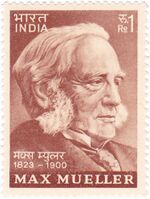Difference between revisions of "Müller, M."
| Line 7: | Line 7: | ||
|yeardeath=1900/10/28 | |yeardeath=1900/10/28 | ||
|bornin=Dessau, Duchy of Anhalt, German Confederation | |bornin=Dessau, Duchy of Anhalt, German Confederation | ||
| − | |bio=Max Müller, in full Friedrich Max Müller, (born Dec. 6, 1823, Dessau, duchy of Anhalt [Germany]—died Oct. 28, 1900, Oxford, Eng.), German scholar of comparative language, religion, and mythology. Müller’s special areas of interest were Sanskrit philology and the religions of India.</br> | + | |bio=Max Müller, in full Friedrich Max Müller, (born Dec. 6, 1823, Dessau, duchy of Anhalt [Germany]—died Oct. 28, 1900, Oxford, Eng.), German scholar of comparative language, religion, and mythology. Müller’s special areas of interest were Sanskrit philology and the religions of India.</br> |
| − | |||
The son of Wilhelm Müller, a noted poet, Max Müller was educated in Sanskrit, the classical language of India, and other languages in Leipzig, Berlin, and Paris. He moved to England in 1846 and settled in Oxford in 1848, where he became deputy professor of modern languages in 1850. He was appointed professor of comparative philology in 1868 and retired in 1875.</br> | The son of Wilhelm Müller, a noted poet, Max Müller was educated in Sanskrit, the classical language of India, and other languages in Leipzig, Berlin, and Paris. He moved to England in 1846 and settled in Oxford in 1848, where he became deputy professor of modern languages in 1850. He was appointed professor of comparative philology in 1868 and retired in 1875.</br> | ||
Müller was instrumental in editing and translating into English some of the most ancient and revered religious and philosophical texts of Asia. Especially noteworthy are his edition of the great collection of Sanskrit hymns the Rigveda, Rig-Veda-samhitâ: The Sacred Hymns of the Bráhmans (6 vol., 1849–74); his work as editor of the 51-volume series of translations The Sacred Books of the East; and his initial editing of the series Sacred Books of the Buddhists. In addition, Müller was an important early proponent of a discipline that he called the “science of religion”; indeed, some credit him with founding that field. His most important writings on the subject include Essays on the Science of Religion (1869), vol. 1 of Chips from a German Workshop; Introduction to the Science of Religion (1873); and Lectures on the Origin and Growth of Religion (1878). | Müller was instrumental in editing and translating into English some of the most ancient and revered religious and philosophical texts of Asia. Especially noteworthy are his edition of the great collection of Sanskrit hymns the Rigveda, Rig-Veda-samhitâ: The Sacred Hymns of the Bráhmans (6 vol., 1849–74); his work as editor of the 51-volume series of translations The Sacred Books of the East; and his initial editing of the series Sacred Books of the Buddhists. In addition, Müller was an important early proponent of a discipline that he called the “science of religion”; indeed, some credit him with founding that field. His most important writings on the subject include Essays on the Science of Religion (1869), vol. 1 of Chips from a German Workshop; Introduction to the Science of Religion (1873); and Lectures on the Origin and Growth of Religion (1878). | ||
Revision as of 06:09, 30 July 2020
| English Phonetics | Friedrich Max Müller |
|---|---|
| Sort Name | Max Müller |
| Birth: | 1823/12/06 |
|---|---|
| Death: | 1900/10/28 |
| Place of birth: | Dessau, Duchy of Anhalt, German Confederation |
Tibetan calendar dates
| Primary Language: | German |
|---|---|
| Translates from: | Sanskrit |
- Primary Affiliation (Workplace)
- Oxford University
PhD University
- Leipzig University
Biographical Information
Max Müller, in full Friedrich Max Müller, (born Dec. 6, 1823, Dessau, duchy of Anhalt [Germany]—died Oct. 28, 1900, Oxford, Eng.), German scholar of comparative language, religion, and mythology. Müller’s special areas of interest were Sanskrit philology and the religions of India.
The son of Wilhelm Müller, a noted poet, Max Müller was educated in Sanskrit, the classical language of India, and other languages in Leipzig, Berlin, and Paris. He moved to England in 1846 and settled in Oxford in 1848, where he became deputy professor of modern languages in 1850. He was appointed professor of comparative philology in 1868 and retired in 1875.
Müller was instrumental in editing and translating into English some of the most ancient and revered religious and philosophical texts of Asia. Especially noteworthy are his edition of the great collection of Sanskrit hymns the Rigveda, Rig-Veda-samhitâ: The Sacred Hymns of the Bráhmans (6 vol., 1849–74); his work as editor of the 51-volume series of translations The Sacred Books of the East; and his initial editing of the series Sacred Books of the Buddhists. In addition, Müller was an important early proponent of a discipline that he called the “science of religion”; indeed, some credit him with founding that field. His most important writings on the subject include Essays on the Science of Religion (1869), vol. 1 of Chips from a German Workshop; Introduction to the Science of Religion (1873); and Lectures on the Origin and Growth of Religion (1878).
Source and more details to be found here: ENCYCLOPÆDIA BRITANNICA
- Wiki Pages
Full Name[edit]
Friedrich Max Müller
